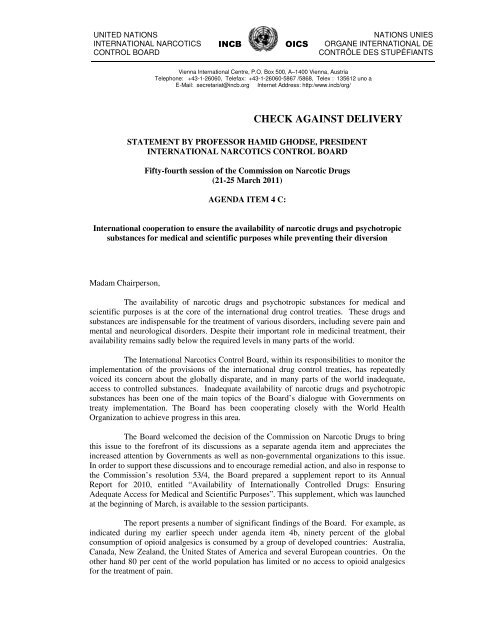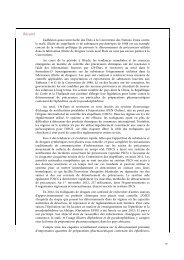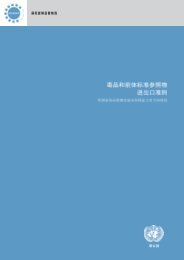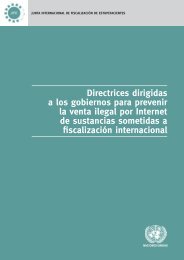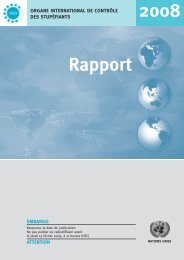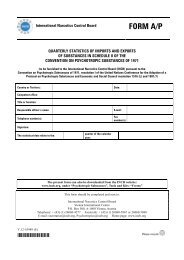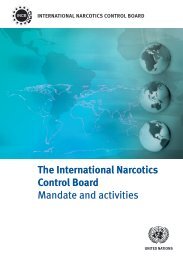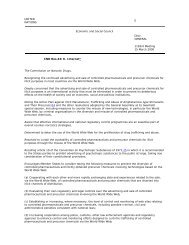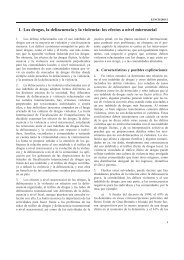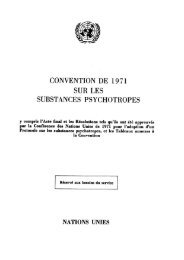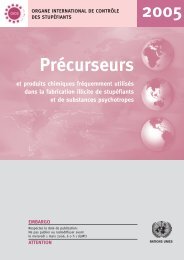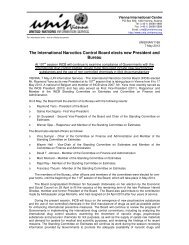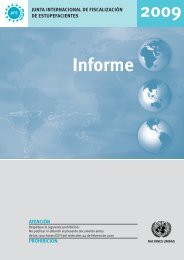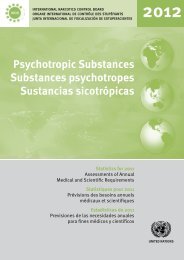CHECK AGAINST DELIVERY - INCB
CHECK AGAINST DELIVERY - INCB
CHECK AGAINST DELIVERY - INCB
Create successful ePaper yourself
Turn your PDF publications into a flip-book with our unique Google optimized e-Paper software.
UNITED NATIONSINTERNATIONAL NARCOTICSCONTROL BOARD<strong>INCB</strong>OICSNATIONS UNIESORGANE INTERNATIONAL DECONTRÔLE DES STUPÉFIANTSVienna International Centre, P.O. Box 500, A–1400 Vienna, AustriaTelephone: +43-1-26060, Telefax: +43-1-26060-5867 /5868, Telex : 135612 uno aE-Mail: secretariat@incb.org Internet Address: http:/www.incb/org/<strong>CHECK</strong> <strong>AGAINST</strong> <strong>DELIVERY</strong>STATEMENT BY PROFESSOR HAMID GHODSE, PRESIDENTINTERNATIONAL NARCOTICS CONTROL BOARDFifty-fourth session of the Commission on Narcotic Drugs(21-25 March 2011)AGENDA ITEM 4 C:International cooperation to ensure the availability of narcotic drugs and psychotropicsubstances for medical and scientific purposes while preventing their diversionMadam Chairperson,The availability of narcotic drugs and psychotropic substances for medical andscientific purposes is at the core of the international drug control treaties. These drugs andsubstances are indispensable for the treatment of various disorders, including severe pain andmental and neurological disorders. Despite their important role in medicinal treatment, theiravailability remains sadly below the required levels in many parts of the world.The International Narcotics Control Board, within its responsibilities to monitor theimplementation of the provisions of the international drug control treaties, has repeatedlyvoiced its concern about the globally disparate, and in many parts of the world inadequate,access to controlled substances. Inadequate availability of narcotic drugs and psychotropicsubstances has been one of the main topics of the Board’s dialogue with Governments ontreaty implementation. The Board has been cooperating closely with the World HealthOrganization to achieve progress in this area.The Board welcomed the decision of the Commission on Narcotic Drugs to bringthis issue to the forefront of its discussions as a separate agenda item and appreciates theincreased attention by Governments as well as non-governmental organizations to this issue.In order to support these discussions and to encourage remedial action, and also in response tothe Commission’s resolution 53/4, the Board prepared a supplement report to its AnnualReport for 2010, entitled “Availability of Internationally Controlled Drugs: EnsuringAdequate Access for Medical and Scientific Purposes”. This supplement, which was launchedat the beginning of March, is available to the session participants.The report presents a number of significant findings of the Board. For example, asindicated during my earlier speech under agenda item 4b, ninety percent of the globalconsumption of opioid analgesics is consumed by a group of developed countries: Australia,Canada, New Zealand, the United States of America and several European countries. On theother hand 80 per cent of the world population has limited or no access to opioid analgesicsfor the treatment of pain.
Similar disparities exist in the consumption of psychotropic substances, althoughcomparisons of consumption levels of these substances are more difficult, since under the1971 Convention Governments are not required to report data on the consumption ofpsychotropic substances to the Board. This results in an inadequacy of information availableto the Board for the analysis of consumption levels of psychotropic substances. The Boardtherefore invites the Commission to examine this matter and encourages Governments to startproviding information on the consumption of psychotropic substances to the Board, on avoluntary basis as soon as possible.In order to support the availability of controlled substances, the Board monitors theglobal supply of and demand for opiate raw materials. I am pleased to reassure theinternational community that the global supply of opiate raw materials is more than adequateto ensure that opiates can be produced in the quantities required for medical purposes.Similarly, there is sufficient global capacity for the manufacture of synthetic opioids.Manufacture of all opioid medications has increased fivefold over the last 20 years.These impressive growth rates in manufacture and consumption did not howeverbenefit the whole world. The growth rates were actually mainly caused by strong growth ratesof manufacture and imports in countries where consumption was already high. In many ofthe low consumption countries, levels remained low or in some cases even decreased. It is asad reality that the readily available supply of licitly produced opioid raw materials, and theend products manufactured from those raw materials, did not lead to the adequate supply ofthese medicines to all patients in need, worldwide.Access to medicines containing internationally controlled substances is limited oralmost non-existent in many countries. Major differences in consumption levels existbetween regions but also between countries within the same region and with similar levels ofsocio-economic development. These differences are shown in the graphs and the tablescontained in the aforementioned report of the Board on the availability of internationallycontrolled drugs. Each country should check its ranking in these tables. If a country isidentified as a particularly low consumer country within its region, and especially if a countryis identified as consuming a level of opioid analgesics below the benchmark of 200 defineddaily doses per million inhabitants per day, action needs to be taken immediately in order toimprove the situation of patients - patients who are suffering because of inadequate paintreatment.In its attempt to address the barriers to the availability of narcotic drugs, the Boardhas identified the most prevalent impediments and recommended specific actions to overcomethese impediments. It appears that the major barriers are (i) concerns about addiction and (ii)resistance to prescribe. These barriers need to be overcome through the provision of trainingfor doctors and health care workers. Competent authorities will also need to verify whetheroverly restrictive laws and administrative burdens play a major role in the low levels ofconsumption of their country. And, finally, infrastructure and distribution mechanisms needto be developed, in order to ascertain that a country’s public health sector has the capacity tosupply the required medication to the patients in need.Over the last 20 years, several countries have acted and have succeeded inremoving impediments to availability. These countries have observed remarkableimprovements. Educational efforts geared towards health professionals, but also towards thegeneral public, have changed the attitude of doctors and patients and have led to significantincreases in opioid consumption in a number of countries. Special pain clinics as well aschanges in the public health insurance schemes have lead to marked improvements in theavailability of these medicines.2 of 3
Madam Chairperson,Impediments vary between countries and it is the responsibility of the respectiveauthorities to identify these impediments and take appropriate countermeasures. An extensivelist of remedial actions that could be taken by Governments is included in the section ofrecommendations in the Board’s supplement on availability.However, the very first step that needs to be taken is the identification of the actualrequirements for internationally controlled substances in a country. The success of suchefforts depends, to a large extent, on a well-functioning drug control system. Without aneffective drug control system, countries will not be able to assess the present consumptionlevels, identify the additional quantities required under existing treatment facilities, and definethe required improvements in the health care infrastructure and the drug distribution systemthat would allow the medications to reach the patients in need of them.The Board’s experience has clearly shown that countries which are in a position toadequately estimate and assess their requirements for narcotic drugs and psychotropicsubstances are able to take the steps required to improve availability. The process ofestablishing the mechanism and developing the expertise to make appropriate estimates andassessments of legitimate requirements inevitably leads to improved supply of internationallycontrolled substances. Obtaining accurate information about the legitimate requirements forsuch substances is a prerequisite to ensuring their availability.Sadly, there are still many countries which are not able to provide adequateestimates and assessments. It is even more disturbing that there are several countries that arenot able to provide such estimates at all. In order to support these countries the Board, incooperation with WHO, is presently developing guidelines on estimating requirements forinternationally controlled substances. These guidelines will assist Governments with lowlevels of consumption of controlled substances to become aware of their requirements and,ultimately, submit to the Board estimates and assessments that reflect more accurately thoserequirements.Madam Chairperson,The Board appreciates and welcomes the increased attention given by theCommission on Narcotic Drugs to the subject of availability of internationally controlledsubstances and hopes that this increased attention will result in appropriate public healthpolicies to ensure worldwide improvements in the availability of internationally controlledsubstances. The Board will continue to support Governments in this regard, in accordancewith its mandate under the international drug control treaties.Thank you, Madam Chairperson.3 of 3


